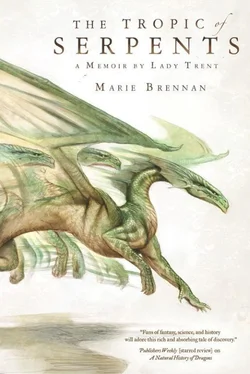We conversed on a variety of topics then, exploring as widely as my limited vocabulary and Faj Rawango’s instructions from his royal master would allow. The former was more of a restriction than the latter, but I soon discovered (through my customary curiosity and lack of discretion) that the political climate of Bayembe was not a suitable subject. The man did not chastise me for asking, but he showed a marked disinclination to speak about the movement of Ikwunde troops that had so spooked the new man at the Foreign Office, or even more generally about the expansionist ambitions of the inkosi, their ruler. Nor would he speak of the Talu, the “union” to the north that was, in truth, an empire by another name, assimilating its neighbours one by one. Clearly such matters were not for the likes of him to share with Scirling outsiders—even outsiders here for non-political purposes.
(Yes, I thought my stay in the region would be non-political. When you have finished laughing, you may proceed.)
We spoke instead of the men and women we passed, Faj Rawango giving me my first education in distinguishing one people from another, which in retrospect was at least as valuable to me as his political opinions would have been. Physical distinctions are, of course, often muddied by intermarriage, but enough patterns persist in that region to be of moderate use, and of course the apparel and ornament of each people has its variations. Nowhere, however, did I see anyone resembling Faj Rawango himself, and he deflected me when I asked. My suspicion that he was of foreign birth grew, but I did not press.
In this manner did we ride through the fortified gates of Nsebu and into the grass beyond.
These days the two places have run together into one indistinguishable city, but back then Nsebu and Atuyem were quite separate. The former had a small port district that had, up until fifty years ago, been all there was of the town. Increased trade had spurred its growth, and then the alliance between Scirland and Bayembe had seen the construction of the fort at Point Miriam, with the colony following soon after. Now Nsebu was a strangely hybrid place, creeping across the open ground toward the more aristocratic precincts of Atuyem.
These sit above Nsebu both socially and physically, on a plateau high enough to enjoy cooling winds, but near enough to the port to benefit from the trade; which is why Bundey n Mawo Nsori, the reigning oba a century before, had moved his primary residence there. Atuyem is further stratified between the lower town and the upper, which perches atop a rocky, flat-topped hill, the better to command a view of the surrounding countryside. The walls of the oba’s fortified residence rose higher still, a crown surmounting that stony head, and they shone gold in the afternoon light.
Much of that gold was metaphorical, an illusion created by the color of the soil used in building the walls and the warm glow of the sun. The highest tower within the complex, however, gleamed too brightly for mere dirt. The stories were untrue, that the oba of Bayembe lived in a palace of solid gold; but one tower, at least, had been plated in the substance.
It was a suitably impressive display of wealth—though one the oba perhaps regretted in a time of such conflict and greed. Then again, Bayembe’s gold was not what attracted interest from Satalu, Ikwunde, and Scirling alike. Iron was the prize those three lands sought to claim.
Around that central fortress spread the courtyards and compounds of his chief nobles, patriarchs of the various lineages that made up the aristocracy of Bayembe. These had, over the years, grown too numerous and extensive, crowding all others off the small hilltop, exiling the common folk to houses and shops gathered around the rocky skirts of the hill. Our little party attracted a great deal of attention as we rode through, for our escorts were clearly royal warriors, and Faj Rawango a high official; nor had Scirlings become so common here as to be unworthy of remark, as they were in Nsebu. Natalie and I drew particular commentary, Scirling ladies being very uncommon in any part of Bayembe.
I rode self-consciously, feeling the burden upon me of representing my race and my sex to these people. My clothing—travel wear that was simple to the point of tedium by Scirling standards—seemed fussy and overcomplicated here, designed for sensibilities and a climate foreign to this place. I knew my face was flushed and damp with sweat, and likely sunburnt despite the protection of my bonnet, and the gritty dust of these grasslands clung to me all over. As representatives went, I felt like a shabby one indeed.
We circled the base of the hill along what was clearly the main road, until we came to a gate built in the style of these lands: hard-pounded earth, decorated with bright tiles, and studded regularly with wooden struts that were, as I understood it, both internal supports and climbing aids for when the exterior needed repair. Here Faj Rawango conversed briefly and incomprehensibly with a guard, making it apparent just how much he had slowed and clarified his speech for my sake. Thus interviewed, we rode onward, and began our ascent of the hill at its gentlest point.
The Atuyem we traveled through now was entirely different. Instead of the clamour and crowds of the base, we passed the near-faceless walls of the lineage compounds, whose decorative tiles communicated a message beyond my skill to translate. Guards stood at the gates, and servants traversed the roadway, some of them bearing the shaded palanquins of their masters. Where the curtains were gauzy, I could glimpse dark shadows within, that sometimes stretched out gold-laden hands to twitch the fabric aside and study us directly. These stares were different from the ones before: to the nobles of the heights, we were not mere curiosities, but new variables in the political equation of their land. Whether our effect would be positive or negative had yet to be determined.
It was both a relief and a fresh source of tension to ride through the mighty gates of the oba’s own fortress, away from those measuring eyes. We dismounted in a front courtyard and were met by kneeling servants who offered up bowls of fresh, cool water with which to cleanse our faces and hands. Our escort stood at attention while we conducted our ablutions, then saluted and jogged once more out the gates.
In their place came a pair of what I guessed to be upper servants, one male and one female. “Rooms have been prepared,” our guide said. “These two will show you.”
The presence of two servants gave me a hint as to what we might expect. “Are our quarters separate?” I asked.
Faj Rawango nodded, with an impassivity I read to mean he had anticipated the question, but still thought me a simpleton for asking. “Men and women do not lodge together in the royal palace.”
I wondered what they would have done had Jacob been alive, and here with me. Were married couples given joint quarters, or did husbands have to arrange to call upon their wives? But that was hardly the sort of question I had come here to ask. “We intend to spend much of our time together,” I said instead. “Our work requires it.”
“Of course,” Faj Rawango said, all courtesy. “There are public areas.”
Where we could be watched, I supposed, for any hint of improper behaviour. I had hoped to leave that sort of thing behind in Scirland.
We suffered ourselves to be led away, Mr. Wilker in one direction, Natalie and I in another. Our new guide was an older woman, her hair faded to an iron-grey that reminded me of Scirland’s interests in this region. She led us through a honeycomb of courtyards and colonnades, until at last we climbed a set of stairs to a cool and airy room tiled in blue.
By now I was tired enough that my brain had become sulky about handling a foreign tongue, but I understood from the woman’s words that this was to be a shared residence for Natalie and myself. It was sparsely furnished by Scirling standards, with a few padded benches and stools of the kind that can be folded out of the way when not in use, and chests for our belongings. The bed was draped with gauzy curtains, the better to keep out troublesome insects while still allowing cooling breezes through. After the cramped conditions of the ship and the rigor of a long ride, it seemed to me like a small corner of heaven.
Читать дальше












